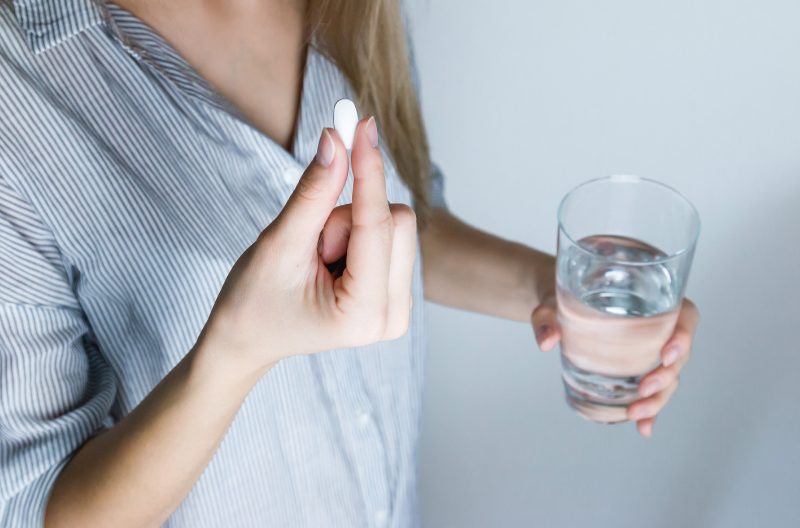Vitamin B12 has a long history. There are so many vitamin B12 benefits that it’s considered by many to be the new cure-all for whatever ails you.
However, it ca is not produced by our bodies. So, we must get it elsewhere – usually from meat sources.
But this raises a question: if lean-meat and plant-based diets are healthier and promote longevity, how can we get our essential vitamin B12 benefits? And, is it possible without B12 supplements? Vitamin B12 deficiency symptoms can be debilitating, so it’s important we learn how to consume this powerful vitamin.
The answer comes by looking far and wide to other cultures and regions to discover how centenarians who eat plant-based diets manage to maintain high vitamin B12 levels.
What is Vitamin B12?
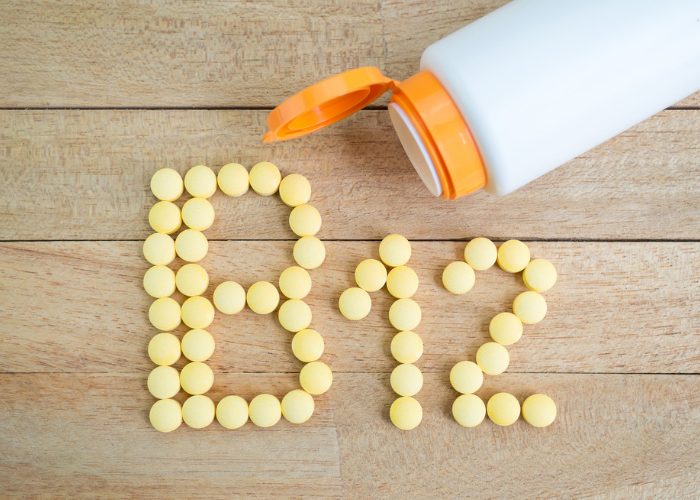
Vitamin B12 (also known as cobalamin) is an essential vitamin. That means our body needs it but does not create it on its own. So, we must get a daily dose of it elsewhere.
Vitamin B12 is vital for cell metabolism.[1] It is responsible for cell development and division, which helps form DNA.[2] It also helps us extract energy from proteins and fats, and carries oxygen through our red blood cells.[3] This process of cell division also benefits our immune system by generating more red blood cells that help fight infections.[4]
It is a water-soluble vitamin, so it is easily absorbed by the body.[5] This means that any excess is excreted through our urine rather than stored in the liver.[6] Therefore, we must replenish our stores of vitamin B12 every day through food or a supplement. Otherwise, vitamin B12 deficiency symptoms may start appearing.
What Does it Do? 10 Benefits of Vitamin B12
Vitamin B12 benefits can fill pages and pages. There are hundreds, if not thousands of studies that prove its value. However, no clinical trials have been completed to provide a standard of guaranteed results for specific conditions using an exact dose. For that reason, most claims are for you to conclude with your healthcare professional.
1. Provides energy
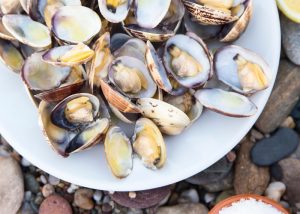
Vitamin B12 benefits our low energy problems. One of its major functions within our bodies is to extract energy from food and carry oxygen through our blood. This oxygen gives us energy.
In a study where patients lacked energy, they were given an injection of 14mcg – 70mcg of vitamin B12 followed by a 1000mcg oral dose.[7] Every one of the patients in the study reported increased energy. These results occurred even where the patients did not have a vitamin B12 deficiency.
2. Lessens fatigue
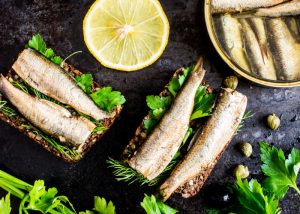
This vitamin will help fight fatigue. Fatigue is the chronic form of a lack of energy. In one study, thirty-eight women were given injections of 5mg of vitamin B12 for six months to seven years.[8] All but one of the women noticed a difference. Those subjects who noticed a dramatic difference took injections every four days. The respondents with a mild response took injections every six days.
3. Promotes weight loss
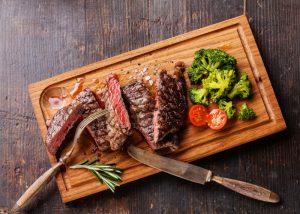
It also benefits our metabolism. It metabolizes fat and protein into energy, so it keeps our metabolism functioning properly. This process converts the food we eat into energy we can use. We can use this energy to exercise, or even just to live a more active life instead of a sedentary one.
4. Calms nerve pain
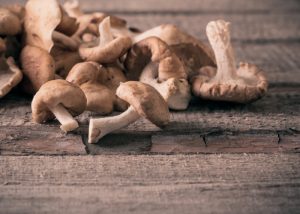
Vitamin B12 is the sole provider of the nutrient that creates myelin, the sheath over our central nervous system that transmits impulses between our brain and our body. As long as our myelin remains healthy, nerve problems can be controlled.
Specifically, it helps minimize and prevent nerve pain. In particular, pain caused by shingles, diabetes, or cancer drugs.[9] And, it even minimizes damage to the central nervous system caused by diabetes.[10]
5. Hangover cure
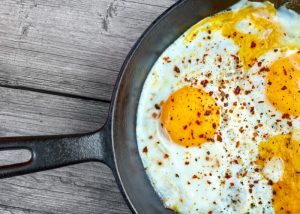
One great vitamin B12 benefit is as a hangover cure! For as long as there has been alcohol, there has been a search for a hangover cure (one that isn’t the hair of the dog).
Vitamin B12 benefits our entire body and controls many vital bodily functions. When vitamin B12 levels are low, you may feel out-of-focus, fatigued, confused, and achy, the same way you feel the morning after a party. Vitamin B12 helps restore energy levels and mental acuity.
There are few if any studies on this exact issue, but dozens of personal testimonials and recommendations on the veracity of vitamin B12 as a hangover cure.
6. Helps depression
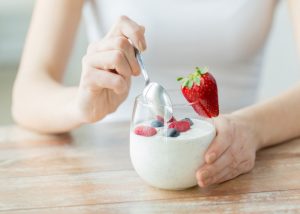
Research has shown that vitamin B12-deficient subjects were twice as likely to experience severe depression than those with normal levels of vitamin B12.[11] Furthermore, the same study revealed that depressed women exhibit a deficiency in this vitamin more than non-depressed women.[12] And finally, 100% of depressed subjects showed a 20% reduction in symptoms by taking vitamin B12.
7. Reduces memory loss
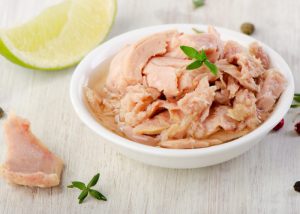
This vitamin also benefits our memory. Memory loss occurs with conditions such as dementia, Alzheimer’s disease or even amnestic disorders. In a study of 100 amnestic patients, vitamin B12 was instrumental for memory tests.[13] Specifically, the subjects with high levels showed significant improvement in learning ability and recognition performance.[14]
Another study on the elderly in the early stages of dementia proved that vitamin B12 combined with omega-3 fatty acids lowered homocysteine, which slowed brain atrophy and cognitive decline.[15]
8. Assists neurological function
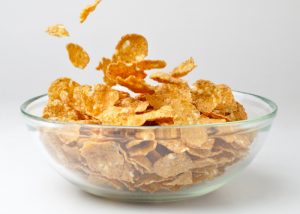
Another benefit it provides is to our brains. Low or deficient vitamin B12 augments the amino acid homocysteine in the blood. High levels of this amino acid also worsen neurological function in older adults.[16]
In a six-year study on older subjects with poor motor and sensory nerve ability, exhibited by impaired balance and repeatedly falling over, vitamins B6, B12, and folic acid reduced the homocysteine levels that caused these issues.[17]
9. Heart health
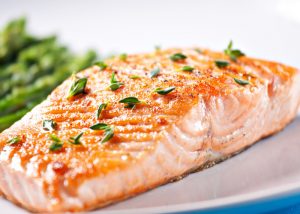
Homocysteine is also linked to coronary heart disease and cardiovascular disease. But, in an analysis of 34 reports on vegetarians and fatal heart disease, a dramatically lower incidence was expected. However, this was not the case, because vitamin B12 deficiency negates the benefits of heart disease prevention of the plant-based diet.[18]
10. Lowers risk of macular degeneration

Vitamin B12 helps us see, but it is harder to absorb as we get older. So, some common conditions affecting the elderly can be reduced, prevented, or remedied with a daily dose of it. Macular degeneration is one of these conditions.
High levels of homocysteine mirrored with vitamin B12 insufficiency contributes to vision loss as we age. Macular degeneration is the leading cause of age-related blindness, and it affects 25-30 million people worldwide.[19] In a study lasting for seven years on 5,000 women over age 40, vitamin B12 reduced the risk of macular degeneration by 34%, and in severe cases, by 41%.[20]
Vitamin B12 Deficiency Symptoms to Look Out For
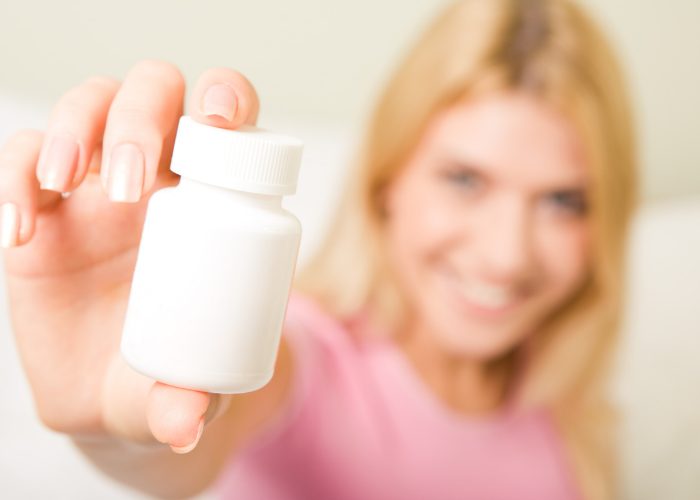
In the U.S. and the U.K., there are an estimated 6% of people aged 60 and older who are vitamin B12 deficient.[21] And, this number increases with age, due mostly to malabsorption of the vitamin.
However, vitamin B12 deficiency symptoms also occurs in younger populations due to low intake of animal proteins. There are around 20% of people in the U.S. and U.K. on the borderline of deficiency.[22]
Be aware of these symptoms:
- Tiredness[23]
- Weakness[24]
- Numbness and tingling in the hands and feet[25]
- Problems with balance[26]
- Depression[27]
- Confusion[28]
- Dementia[29]
- Poor memory[30]
One study showed that clinical vitamin B12 deficiency may be a cause of infertility or recurrent spontaneous abortion.[31] The study also found that the risk of birth defects such as neural tube defects (NTD) may be increased for women beginning their pregnancy with a B12 deficiency. Another study showed that the infants of lactating mothers with a vitamin B12 deficiency showed signs of lethargy, loss of tone, and even the regression of skills.[32]
11 Vitamin B12 Foods to Try
Vitamin B12 benefits come in the form of foods. These are mostly limited to meat, eggs, fish, and milk products.[33]
However, one study conducted on Korean centenarians found that vitamin B12 deficiency was lower than that of centenarians in the West with animal-oriented diets.[34] In the Georgia Centenarian Study, 38% of non-anemic older people ranging in age from 85-100 were deficient in vitamin B12, while the study on Korean centenarians found only 11.3% to be deficient.[35], [36]
In Korea, the diet centers around plants and grains, with very little meat or animal products. This study found that some traditional soybean-fermented foods, such as doenjang and cheonggukjang, along with seaweeds, contain considerable amounts of vitamin B12.[37]
Here’s a list of Vitamin B12-rich foods you can try:[38]
1. Doenjang
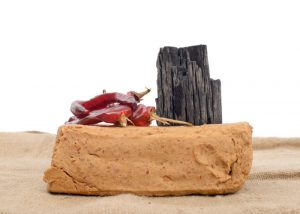
Doenjang is a strong-tasting paste made from fermented soybean curd. It can be used as a condiment with vegetables, as a seasoning, or most often, as ssambap, a dish made into a lettuce leaf wrap stuffed with doenjang mixed with garlic, sesame oil, and chili paste. It has 1.85mcg of vitamin B12 per 100g.[39]
2. Cheonggukjang
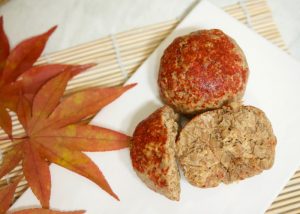
Cheonggukjang is another type of soybean paste. It is fermented for less time than doenjang. During the fermentation process, salt and chili paste is added. Cheonggukjang has 0.69mcg of vitamin B12 per 100g.[40]
3. Nutritional yeast
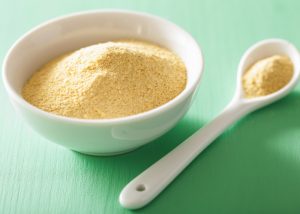
Nutritional yeast is a seasoning with a strong nutty, cheesy flavor. It tastes good as a topping on potatoes, vegetables, and popcorn. Fortified varieties ensure sufficient vitamins. One tablespoon of nutritional yeast provides 3.4g of vitamin B12.[41]
4. Tempeh
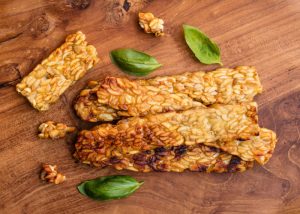
This is a fermented meat substitute made from soy. It is great diced and pan-roasted, then added to salads or curries, or even cooked on the grill with BBQ sauce. It has between 0.18-4.1mcg of vitamin B12 per 100g.[42]
5. Fortified soy milk
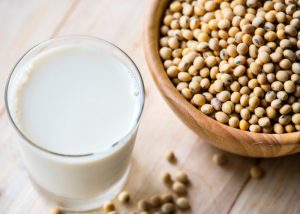
Like cow’s milk, soy milk is fortified with vitamin B12. Silk Unsweetened Soy Milk offers 3mcg of vitamin B12 per one cup serving.
6. Fortified cereals
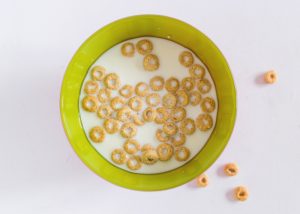
Commercially available processed cereals are all fortified with vitamin B12. For example, Corn Flakes has 6mcg, Malt-o-Meal has 8.2 mcg, and All Bran has 24mcg per serving.
7. Dried shiitake mushrooms
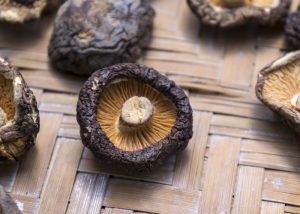
Dried shiitake mushrooms are available in most superstores. They must be rehydrated with boiling water, then sliced. You can add shiitake mushrooms to soups, stir-frys, and curries, as they absorb flavors well. You can even try making a shiitake quinoa dish! These dried mushrooms contain 5.6mcg of vitamin B12 per 100g dried weight.[43]
8. Black trumpet and golden chanterelle mushrooms

You can find these mushrooms at health food stores or online. While they are quite expensive, a single four-ounce bag serves several people. As with dried shiitake mushrooms, they need to be rehydrated with boiling water before cooking them. They contain 1.09-2.65mcg of vitamin B12 per 100g dried weight.[44]
9. Dried green laver
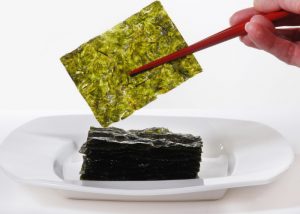
Dried green laver is used in sushi rolls and seasoning flakes, such as furikake. These flakes can be sprinkled over omelets, rice, noodles, or popcorn. It has 63.6mcg of vitamin B12 per 100g.[45]
10. Purple laver
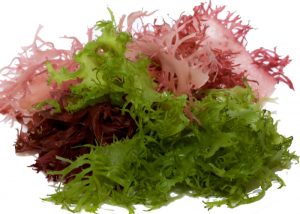
This seaweed is grown in the U.K. and in Asia, on rocks and stones exposed to sandy beaches. It is used to make laverbread in the U.K. In Asia, it is used in sushi rolls. It was scientifically shown to help vitamin B12-deficient rats fully reverse their vitamin B12 deficiency.[46] Purple laver has 32.3mcg of vitamin B12 per 100g.[47]
Some sources argue that green and purple laver do not contain vitamin B12, but the vitamin B12 dosage is actually from microorganisms that live within the algae.[48] Thus, they argue that the dose is uncertain.
11. Banana peels
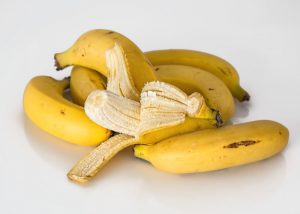
While there is no scientific proof of this, banana peels are touted to be rich in vitamin B12.[49] Internationally, many people eat the peel and claim that it has vitamin B12. Banana peels can be made into a tea or into gluten-free flour.[50] Banana peels can also be chopped and added to smoothies, steamed with rice, or fried.
Should I Take B12 Shots/Injections or Supplements?
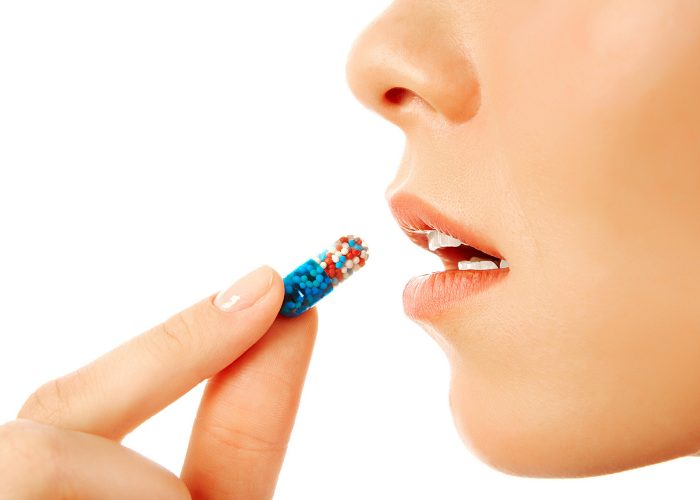
Vitamin B12 supplementation is a good idea, especially for target groups:
- Over age 50
- Pregnant or nursing
- Vegan or vegetarian
- Anemic
- Diabetic
- Family history of dementia or Alzheimer’s
- Chronic Fatigue Syndrome
- Depressed
There are several modes for taking your vitamin B12 supplement.
- Nasal spray: Nascobal nasal spray is a 500mcg dose in eight sprays per day.[51] This is a potent and fast way to get a shot of vitamin B12. However, there are some serious side effects to nasal spray that include anaphylactic shock and death.
- Injection: Administered by your doctor once a week in 1000mcg doses, this delivery system is most frequently used in studies on vitamin B12. Reports have been mostly positive, with some negative side effects of intense headaches.[52]
- Sublingual liquid: This delivers directly into the bloodstream without waiting for the process of digestion of a pill or capsule. It often uses artificial sweeteners that may be dangerous to diabetics.[53]
- Oral: Oral can be taken by those with low stomach acid and in a variety of sizes and doses.[54]
Pros & Cons
While injections have been considered the superior way to take vitamin B12 supplements, this has recently changed. New research has shown that oral vitamins are equally effective, but their convenience and lower cost makes them more beneficial than injections.[55]
The over-prescribing of injections where a simple capsule will do could bring the cost up to $17.6 million in Ontario, Canada, alone.[56] Over-the-counter oral vitamins can also be better after certain surgeries, like gastro-bypass because you can select the dose that is right for you.
| Pros | Cons | |
| Oral (pills or capsules) | Cheap Effective Convenient | May be hard to swallow |
| Sublingual liquid | Easy Tasty Potent | Artificially sweetened May harm diabetics |
| Injection | Potent | Doctor’s visit required Expensive Headaches |
| Nasal spray | Potent | Possible death |
How Much Vitamin B12 Should I Take? What’s the Correct Dosage?
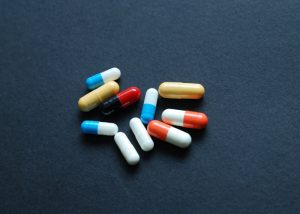
In the U.S., the RDA for vitamin B12 is 2.4 mcg/day for women.[57] In the U.K., the amount is 1.5mcg per day for women.[58]
However, if you suffer from any malady that could be remedied by a vitamin B12 regimen, ask your healthcare provider for guidance.
What Are Some Possible Side Effects? Can You Have Too Much?

Because this vitamin is water-soluble, there is no toxicity to be wary of, as our bodies excrete the excess. However, too much of a good thing does have its detractors.
Studies note that taking between 500-1000mcg can cause kidney issues for diabetics.[59] It may also cause an increased risk of colorectal cancer.[60] And some studies have attributed an excess of vitamin B12 to weight gain.[61]
Because of its low toxicity, no tolerable upper intake level (UL) has been set by the U.S. Food and Nutrition Board.[62]
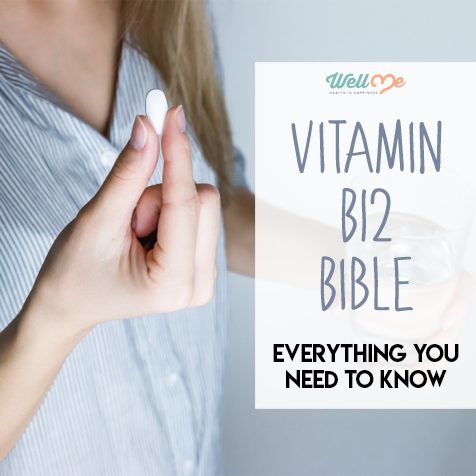
Conclusion
In short, vitamin B12 is an essential vitamin that must be taken from either food or supplements. The benefits are plentiful and backed up by science, so what’s stopping you from getting your daily dose today?
References
- [1] https://researchpedia.info/difference-between-vitamin-b-vitamin-c-and-vitamin-d/
- [2] https://www.dietitians.ca/getattachment/45413d68-0639-4ad6-8de6-10eb97556e5f/FACTSHEET-Food-Sources-of-Vitamin-B12.pdf.aspx
- [3] JHRR. http://www.jhrr.org/article.asp?issn=2394-2010;year=2014;volume=1;issue=1;spage=5;epage=9;aulast=Mahmood
- [4] https://www.ncbi.nlm.nih.gov/pmc/articles/PMC4127173/
- [5] https://researchpedia.info/difference-between-fat-soluble-and-water-soluble-vitamins/
- [6] Researchpedia. https://researchpedia.info/difference-between-fat-soluble-and-water-soluble-vitamins/
- [7] https://www.ncbi.nlm.nih.gov/pmc/articles/PMC4046545/
- [8] https://universityhealthnews.com/daily/energy/vitamin-b12-shots-benefits-for-chronic-fatigue/
- [9] Scielo. http://www.scielo.br/scielo.php?pid=S1806-00132016000100052&script=sci_arttext&tlng=en
- [10] https://www.ncbi.nlm.nih.gov/pubmed/19394404
- [11] https://www.ncbi.nlm.nih.gov/pubmed/10784463
- [12] NCBI. https://www.ncbi.nlm.nih.gov/pubmed/10784463
- [13] https://www.ncbi.nlm.nih.gov/pubmed/26912492
- [14] https://www.ncbi.nlm.nih.gov/pubmed/26912492
- [15] NCBI. https://www.ncbi.nlm.nih.gov/pmc/articles/PMC4927899/
- [16] https://www.ncbi.nlm.nih.gov/pmc/articles/PMC3326240/
- [17] https://www.ncbi.nlm.nih.gov/pmc/articles/PMC3326240/
- [18] NCBI. https://www.ncbi.nlm.nih.gov/pubmed/25998928
- [19] https://www.ncbi.nlm.nih.gov/pmc/articles/PMC4508850/
- [20] https://www.ncbi.nlm.nih.gov/pmc/articles/PMC2648137/
- [21] NCBI. https://www.ncbi.nlm.nih.gov/pubmed/19116323
- [22] https://www.ncbi.nlm.nih.gov/pubmed/19116323
- [23] http://www.jhrr.org/article.asp?issn=2394-2010;year=2014;volume=1;issue=1;spage=5;epage=9;aulast=Mahmood
- [24] JHRR. http://www.jhrr.org/article.asp?issn=2394-2010;year=2014;volume=1;issue=1;spage=5;epage=9;aulast=Mahmood
- [25] https://ods.od.nih.gov/factsheets/VitaminB12-Consumer/
- [26] https://ods.od.nih.gov/factsheets/VitaminB12-Consumer/
- [27] NIH. https://ods.od.nih.gov/factsheets/VitaminB12-Consumer/
- [28] https://ods.od.nih.gov/factsheets/VitaminB12-Consumer/
- [29] https://ods.od.nih.gov/factsheets/VitaminB12-Consumer/
- [30] NIH. https://ods.od.nih.gov/factsheets/VitaminB12-Consumer/
- [31] https://www.ncbi.nlm.nih.gov/pubmed/18709885
- [32] https://www.ncbi.nlm.nih.gov/pmc/articles/PMC3470622/
- [33] Researchpdia. https://researchpedia.info/difference-between-vitamin-b-vitamin-c-and-vitamin-d/
- [34] https://www.hindawi.com/journals/cggr/2010/374897/
- [35] https://academic.oup.com/biomedgerontology/article/67A/1/100/584615
- [36] Current Gerontology and Geriatrics Research. https://www.hindawi.com/journals/cggr/2010/374897/
- [37] https://www.hindawi.com/journals/cggr/2010/374897/
- [38] https://www.ncbi.nlm.nih.gov/pmc/articles/PMC4042564/
- [39] KoreaMed. https://www.koreamed.org/SearchBasic.php?RID=0124KJN/2008.41.5.439&DT=1
- [40] https://www.koreamed.org/SearchBasic.php?RID=0124KJN/2008.41.5.439&DT=1
- [41] https://www.vrg.org/nutrition/b12.php
- [42] Nutrients. https://www.researchgate.net/publication/262108696_Vitamin_B12-Containing_Plant_Food_Sources_for_Vegetarians
- [43] https://www.researchgate.net/publication/262108696_Vitamin_B12-Containing_Plant_Food_Sources_for_Vegetarians
- [44] https://atpscience.com/the-best-sources-of-vitamin-b12-for-veganvegetarians/
- [45] ATP Science. https://atpscience.com/the-best-sources-of-vitamin-b12-for-veganvegetarians/
- [46] https://www.ncbi.nlm.nih.gov/pubmed/11430774
- [47] https://atpscience.com/the-best-sources-of-vitamin-b12-for-veganvegetarians
- [48] B12 Vitamin Org. https://www.b12-vitamin.com/algae/
- [49] https://www.livescience.com/45005-banana-nutrition-facts.html
- [50] https://www.lunduniversity.lu.se/article/watch-students-create-gluten-free-banana-flour
- [51] RX List. https://www.rxlist.com/nascobal-drug.htm#precautions
- [52] https://www.rxlist.com/nascobal-drug.htm#precautions
- [53] https://www.consumerlab.com/answers/is-sublingual-vitamin-b-12-really-better-than-the-pill-form/sublingual_B-12/
- [54] Consumer Lab. https://www.consumerlab.com/answers/is-sublingual-vitamin-b-12-really-better-than-the-pill-form/sublingual_B-12/
- [55] https://www.ncbi.nlm.nih.gov/pmc/articles/PMC5112015/
- [56] https://www.ncbi.nlm.nih.gov/pmc/articles/PMC5112015/
- [57] JHRR. http://www.jhrr.org/article.asp?issn=2394-2010;year=2014;volume=1;issue=1;spage=5;epage=9;aulast=Mahmood
- [58] https://www.plantbasednews.org/post/vegans-cant-get-enough-b12-or-can-they
- [59] https://www.consumerlab.com/answers/can-too-much-b-12-be-dangerous/too_much_b12/
- [60] UHN Daily. https://universityhealthnews.com/daily/energy/vitamin-b12-shots-benefits-for-chronic-fatigue/
- [61] https://www.consumerlab.com/answers/can-too-much-b-12-be-dangerous/too_much_b12/
- [62] http://www.phlabs.com/are-you-overdoing-it-on-the-b12

